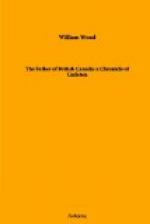To understand the dangers which threatened Canada during the last three years of Carleton’s rule we must go back to February 1793, when revolutionary France declared war on England and there then began that titanic struggle which only ended twenty-two years later on the field of Waterloo. The Americans were divided into two parties, one disposed to be friendly towards Great Britain, the other unfriendly. The names these parties then bore must not be confused with those borne by their political offspring at the present day. The Federals, progenitors of the present Republicans, formed the friendly party under Washington, Hamilton, and Jay. The Republicans, progenitors of the present Democrats, formed the unfriendly party under Jefferson, Madison, and Randolph. The Federals were in power, the Republicans in opposition. When the Republicans got into power in 1801 under Jefferson they pursued their anti-British policy till they finally brought on the War of 1812 under the presidency of Madison. The strength of the peace party lay in the North; that of the war party lay in the South. The peaceful Federals, now that Independence had been gained, were in favour of meeting the amicable British government half-way. When Pitt came into power in 1783 he at once held out the olive branch. Now, ten years later, the more far-seeing statesmen on both sides were preparing to confirm the new friendship in the practical form of Jay’s Treaty, which put the United States into what is at present known as a most-favoured-nation position with regard to British trade and commerce. Moreover, Washington and his Northern Federals much preferred a British Canada to a French one, while Jefferson and the Southern Republicans thought any stick was good enough to beat the British dog with.
The Jeffersonians eagerly seized on the reports of a speech which Carleton made to the Miamis, who lived just south of Detroit, and used it to the utmost as a means of stirring up anti-British feeling. Carleton had said: ’You are witnesses that we have acted in the most peaceable manner and borne the language and conduct of the United States with patience. But I believe our patience is almost exhausted.’ Applied to the vexed questions of the Western Posts, of the lawless ways of the exterminating American pioneers, and of the infinitely worse jobbing politicians behind them, this language was mildness itself. But in view of the high statesmanship of Washington and his government it was injudicious. All the same, Dundas, more especially because he was a cabinet minister, was even more injudicious when he adopted a tone of reproof towards Carleton, whose great services, past and present, entitled him to unusual respect and confidence. The negotiations for Jay’s Treaty were then in progress in London, and Jefferson saw his chance of injuring both the American and British governments by magnifying Carleton’s speech into an ‘unwarrantable outrage.’ He also hoped that an Indian war would upset the treaty




